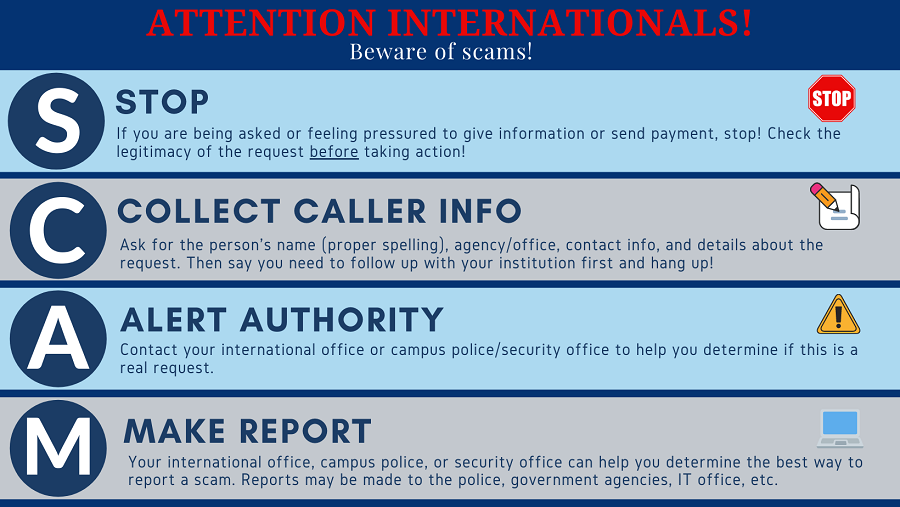While at Rice University we hope that you will not be contacted by someone attempting to "scam" or defraud you of your money or personal information, scam incidents are on the rise. Scammers use various means to scam their victims, such as email, phone, mail, and even social media. As is true anywhere, there are people who attempt to take advantage of international students and scholars, but with a little knowledge you can learn how to identify a scam/fraud and avoid falling victim to their fraud.

Common or Current Scams
- Immigration status threats where individuals are impersonating ICE Agents and falsely claim that your immigration status is in jeopardy and often ask for payment in order to resolve the status issue.
- Third Party tax forms attempt to collect the refund that is rightfully yours.
- Online scams when purchasing items on Craigslist, EBay, Facebook Marketplace, through PayPal, etc.
- Rental scams where your rental deposit money is taken & no one meets you with the keys to move in (Always google the address being advertised & directly call the property – apartment/condo/house – complex number from the official website/contact that is listed under Googlemaps or the official website).
- Calls demanding an "international student tax" or "visa fee" which directs the victim to pay. A scammer will request money through wire-transfer, Apple-pay, Samsung-pay, alternative app payment, or Gift cards.
- A website charging fees to enter the Green Card or H-1B "Lottery".
Common Scam "Red Flags"
- Someone calls and claims you owe money or have committed some kind of fraud/crime.
- A call/email/letter will use fear, threats, and intimidation to get what they want from you.
- A scammer will use lots of legal-sounding language such as "federal regulations," "legal code number," and "visa fee" to sound as authentic as possible.
- A scammer emphasizes immediate action, often without allowing you to verify their identity/claim.
- A scam includes threats of punishment (often of deportation and/or arrest) for not acting immediately.
- A scammer will keep you on the phone for a long time & will not let you hang up to call them back later.
- Scammers sometimes may also make promises of a prize or payment for participating in something by requiring personal information, social security number, and other information that leads to identity theft.
What to do
- Follow the steps on the infographic above - Stop, Collect caller information, Alert authorities (like OISS or Rice campus police), and Make a report to the appropriate agency regarding the fraud.
- ALWAYS ask for a caller's name, ID badge, a phone number and request that you call them back (All valid officials have to allow you to do this, if they insist you cannot verify their identity and/or call back, hang up).
- End the conversation immediately if threats and/or intimidation persist.
- Do not ever cash checks that arrive in the mail unexpectedly.
- Do not sign contracts or documents without reading them and completely understanding the content. If you are unsure, consult with an expert or attorney.
- Please know that the Department of Homeland Security may call you regarding your SEVIS record, but they will NEVER ask for money over the phone or through wire-transfer.
- Check online to see how much of your information is public, such as your phone number and address. This is how scammers seek out their victims.
- Never give out your Social Security Number unless you are sure it is for a legitimate purpose.
- Help fellow internationals avoid scams by sharing this information with your network on social media using the hashtags #AvoidScams and #StudyintheStates
Report to OISS
- If you receive a concerning or suspicious call.
- If a letter arrives in the mail which includes threats for not acting.
- If you receive a letter in the mail that is not on official letterhead, asking for payment.
- If an employer is acting unethically by requiring you to pay money to receive a job offer, or an employment agency is offering to create fake credentials or lie for you.
- Remember: when one person reports a scam, OISS can alert all of our international students and scholars.
- "If in doubt, reach out."
Resources for More Information
- A message from Rachel Canty, Director of the Student and Exchange Visitor Program, published in the September 2019 SEVP Spotlight.
- Department of Homeland Security: Study in the States – Important Message to Students: Protect Yourself from Scams
- Department of Homeland Security: Scams Targeting International Students
- United States Citizenship and Immigration Services (USCIS) – Avoid Scams
- USCIS: Common Scams against Internationals
- USA.gov: Housing and Rental Scams
- USA.gov: Identify Theft
- Federal Trade Commission Scam Alerts
- Federal Trade Commission Consumer Information Blog
- Federal Trade Commission: Imposter Scams
- IRS Imposter Scams (YouTube video)
- Homeland Security Investigation Tip Line Info
- Office of the Inspector General: Scam Awareness
- How to Avoid Rental Fraud Scams
- https://www.ice.gov/contact/ope.
